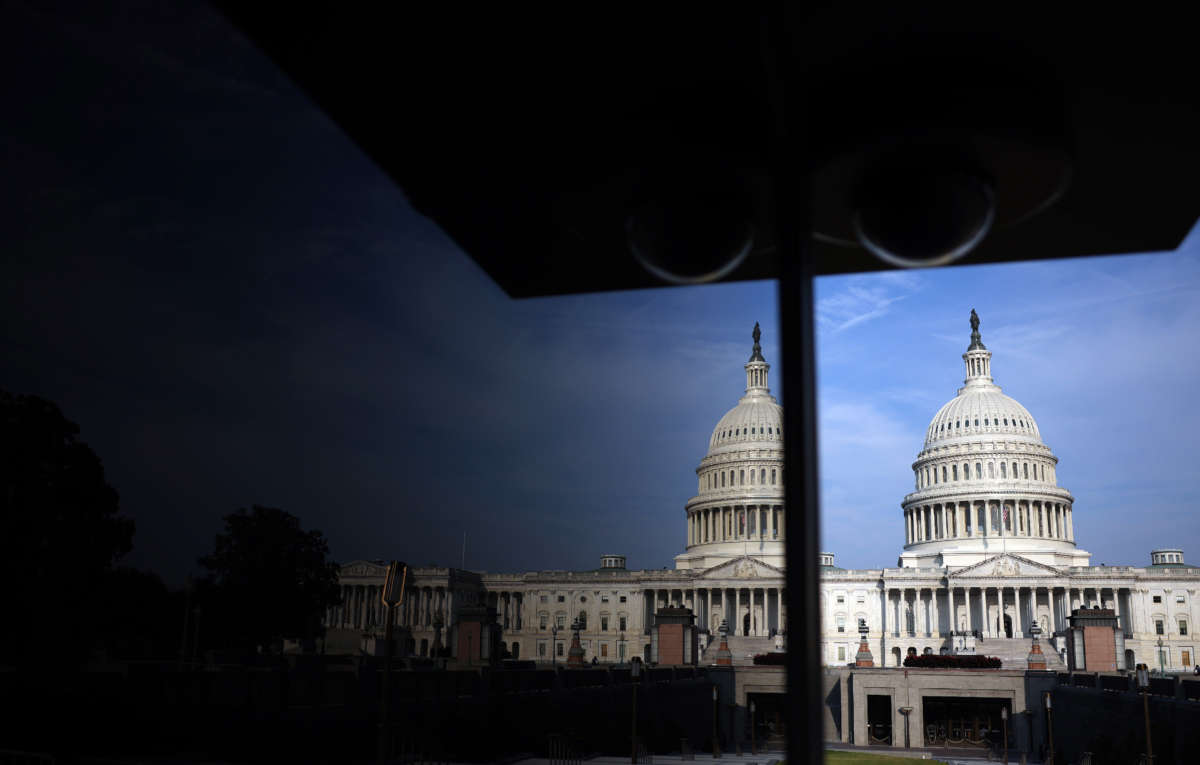Honest, paywall-free news is rare. Please support our boldly independent journalism with a donation of any size.
Republicans have rejected a Democratic offer to wrap up outstanding final details on the bipartisan infrastructure package, imperiling promises from the Senate group to have the bill finished by Monday. This week is crucial for moving ahead on the bill, but there are still outstanding issues over things like funding for mass transit.
Republicans in the bipartisan group objected to Sen. Chuck Schumer’s (D-New York) filing to advance the bill last week, saying that the bill would be ready by Monday. Every Republican in the Senate voted against advancing the bill, making it fall far short of the 60 votes it needed to advance to debate on the floor.
Now, Monday has arrived, and there are still multiple issues that have yet to be hammered out within the group — and the two parties can’t even agree on which issues are still outstanding.
“The ‘global offer’ we received from the White House and Chuck Schumer was discouraging since it attempts to reopen numerous issues the bipartisan group had already agreed to,” a GOP source told CNN. Sen. Rob Portman (R-Ohio) said over the weekend that the outstanding issue was on funding for mass transit on the Republican side.
But, according to Democrats familiar with the negotiations, there are more unresolved issues than just mass transit. Funding for crucial infrastructure like highways, water and broadband are still in question. There’s also still disagreement in terms of how much of the leftover COVID stimulus funds can be used to pay for the bill and on a rule called the Davis-Bacon, which says that federal contractors can’t pay employees less than the “prevailing wage” for construction projects.
Senators were optimistic over the weekend that it can be done soon. “We’re down to the last couple of items, and I think you’re going to see a bill Monday afternoon,” Sen. Mark Warner (D-Virginia) said on Sunday on Fox News. With Republicans rejecting the Democrats’ last offer, that deadline could very well be missed.
If the senators come to an agreement on the bill soon, then Schumer could call a vote to advance the bill again this week. If it fails to garner the required votes, he’ll have to start the process of filing for cloture all over again, which could delay the bill even further.
Time is of the essence as the Senate is set to leave for recess in two weeks. House Speaker Nancy Pelosi (D-California) emphasized again over the weekend that she wants the Democrats’ $3.5 trillion reconciliation bill to be passed with the infrastructure bill, so this week is crucial for getting the bills moving.
Not only are Republicans in disagreement over what’s left to negotiate, they’ve also expressed frustration with Democrats over the transit issue. They claim to have made fair offers to Democrats on transit, and have threatened to withdraw their support unless the Democrats capitulate to their offers. “Unless Democrats show more flexibility, this deal is unlikely to happen,” a GOP source told Politico.
It isn’t much of a surprise that Republicans again seem to be delaying the infrastructure bill. They’ve held up the bill for months in negotiations, and are still unsatisfied with it despite having whittled it down to nearly an eighth of the original size that President Joe Biden had proposed. And, still, they blamed the delay on Monday on Democrats.
“If this is going to be successful, the White House will need to show more flexibility as Republicans have done and listen to the members of the group that produced this framework,” a GOP source told CNN. But the White House has already capitulated to a wide swath of Republican demands, watering the bill down to what it is today.
Instead, it’s Republicans who bear more responsibility for delaying the bill than Democrats. In the first Senate-wide vote on the measure, they had rejected Schumer’s cloture filing last week despite the fact that final details don’t need to be ironed out in order for the bill to advance to debate on the Senate floor, as the majority leader pointed out.
Democrats and progressives have said repeatedly that the months-long delay is a tactic employed by the GOP to polarize and water down Democratic proposals. They point to the example of the Affordable Care Act under President Barack Obama when Republicans similarly dragged out talks for months only to vote against it anyway. In the process, however, they achieved what they set out to do — politicize and weaken the bill considerably.
“My fear is that we could see a repetition of what we saw with the Affordable Care Act,” Sen. Bernie Sanders (I-Vermont) told ABC last week, “where discussions went on and on and on and then never went any place.”
A terrifying moment. We appeal for your support.
In the last weeks, we have witnessed an authoritarian assault on communities in Minnesota and across the nation.
The need for truthful, grassroots reporting is urgent at this cataclysmic historical moment. Yet, Trump-aligned billionaires and other allies have taken over many legacy media outlets — the culmination of a decades-long campaign to place control of the narrative into the hands of the political right.
We refuse to let Trump’s blatant propaganda machine go unchecked. Untethered to corporate ownership or advertisers, Truthout remains fearless in our reporting and our determination to use journalism as a tool for justice.
But we need your help just to fund our basic expenses. Over 80 percent of Truthout’s funding comes from small individual donations from our community of readers, and over a third of our total budget is supported by recurring monthly donors.
Truthout has launched a fundraiser to add 379 new monthly donors in the next 6 days. Whether you can make a small monthly donation or a larger one-time gift, Truthout only works with your support.
